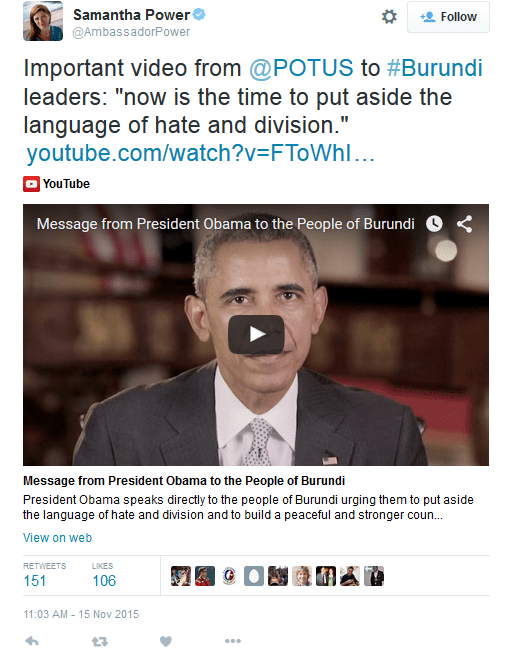Nov 24
20150
Avaaz, Humanitarian Agencies, Imperialist Wars/Occupations, Non-Profit Industrial Complex, The Soros Network | OSI, United Nations, Whiteness & Aversive Racism
African Great Lakes Africom Avaaz Burundi Congo Open Society Institute Paul Kagame Samantha Power Soros Tanzania Tom Perriello Uganda
Creating Failed States | Next up: Burundi
November 24, 2015
by Jay Taber
The White House
Office of the Press Secretary
For Immediate Release
November 23, 2015
+++
“President Obama today issued a new Executive Order (E.O.) declaring a national emergency with respect to the unusual and extraordinary threat to the national security and foreign policy of the United States posed by the situation in Burundi.”
Left: U.S. Ambassador to the UN, Samantha Power. Right: “Butcher of the Great Lakes”, Paul Kagame | “The US based Kagame lobbyists, including the US Ambassador to the UN – Samantha Power – are responsible for the crisis we see in Burundi.” – Dr. Charles Kambanda, Great Lakes Post
The African Great Lakes region (Burundi, Democratic Republic of Congo, Rwanda, Tanzania and Uganda) is rich in mineral wealth. East/West superpower competition for these minerals — used in consumer electronics — has prompted the United States military to arm rebels and dictators alike, as well as to increase the U.S. Africa Command (AFRICOM) presence in the region.
On July 6, 2015, the U.S. State Department announced that Tom Perriello will serve as President Obama’s special envoy for the Great Lakes region of Africa. On November 6, 2015, the State Department announced that Perriello was alarmed by Burundi government violence. On November 8, 2015, U.S. Ambassador to the UN, Samantha Power, in response to the Burundi government offer of amnesty to insurrectionists, warned of Rwanda-like government massacres.
Above: U.S. Secretary of State John Kerry (L) speaks with United States Ambassador to the United Nations Samantha Power during the United Nations Security Council meeting (photo: (Sept. 18, 2014 – Source: Eduardo Munoz Alvarez/Getty Images North America)
As noted by Charles Kambanda, a former professor at the University of Rwanda, what really is happening in Burundi is that multinational corporations are seeking to create a failed state — as they did previously in the Congo — in order to plunder the resources of the region. Avaaz*, an NGO co-founded by Perriello, has called on the UN, US and EU to send in the troops–much like it did in Libya and Syria.
*Avaaz was initially funded in 2006 by George Soros (a currency speculator convicted of insider-trading) through his Open Society Institute.
Further reading: Avaaz Hones In On Burundi as Next U.S. Fait Accompli:
https://www.wrongkindofgreen.org/2015/11/18/avaaz-hones-in-on-burundi-as-next-u-s-fait-accompli/













 Victoire Ingabire Umuhoza tried to run for president in 2010. She was not quite in prison by election day, but she had, since April 1, been under house arrest, forbidden to leave Rwanda’s capital to speak with the country’s rural, subsistence farming majority.
Victoire Ingabire Umuhoza tried to run for president in 2010. She was not quite in prison by election day, but she had, since April 1, been under house arrest, forbidden to leave Rwanda’s capital to speak with the country’s rural, subsistence farming majority.